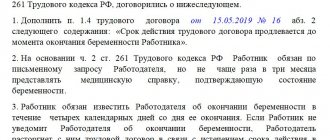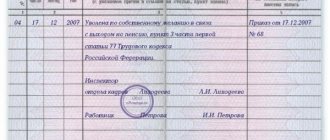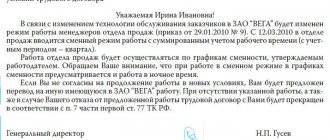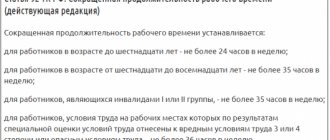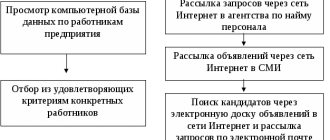The stay of foreigners in Russia, and especially their employment, must comply with the requirements of domestic legislation. Therefore, a mandatory condition for applying for such a person to work is concluding an employment contract with a foreign citizen. The procedure for such employment is somewhat different from the procedure for registration of Russians. Moreover, depending on the status of the migrant, the law may provide for some specifics. This publication will help you understand all the nuances of employment of citizens of other countries in the Russian Federation.
How is the labor activity of foreigners regulated in the Russian Federation?
According to Art. 13 Federal Law “On the legal status of foreigners in the Russian Federation”, citizens of foreign countries can fully realize themselves professionally in Russia. However, such a person is allowed to carry out labor activities if he has reached the age of majority and has received a patent.
Exceptions are cases when such a person:
- permanently or temporarily resides in the Russian Federation;
- is a diplomat, journalist or student at a Russian university;
- is a visiting scientific, medical or pedagogical worker;
- is on tour in Russia for no more than 30 days;
- is a refugee or recipient.
Permits and patents are issued by the territorial departments of the Ministry of Internal Affairs on migration issues upon provision of the necessary package of documents. For certain categories of workers - highly qualified specialists, citizens of countries with a visa-free regime, foreigners undergoing training, specific features are provided for the implementation of work activities.
Read more about how it is done.
How is the employment of foreigners processed?
The procedure for employing foreigners in Russia is made dependent on the status of a citizen of a foreign state. Thus, the procedure for employing migrants permanently or temporarily residing in Russia is identical to the procedure for employing Russians. Therefore, an employment contract between a foreign citizen temporarily residing in the Russian Federation and a private individual or company can be concluded without any additional permits or patents. But at the same time, within three days after formalizing a relationship with a foreigner, the employer must inform the migration authorities about this.
Read more information about.
Anyone who does not have such documents is considered a migrant temporarily staying in the Russian Federation. The procedure for their employment depends on their country of origin. So, if a visa regime is established with it, then it is impossible to do without obtaining permission, sending an invitation and many other requests.
If visa-free, it is enough to conclude an employment contract between an individual and a visa-free foreign citizen under a patent in 2019.
Find out in more detail how to apply.
Dismissal of a foreign citizen
The procedure for dismissing a foreigner is not much different from dismissing a Russian citizen. But even so, there are slight differences. In addition to the generally accepted options regarding foreigners, there are additional grounds:
- Expiration of the residence permit;
- Expiration of the permitted period of work;
- Expiration of the patent term;
- Exceeding the permitted number of foreign workers on the company's staff;
- The company lost the right to hire foreigners;
- The employee's VHI period has expired.
If the reason for termination of the contract between the organization and the foreigner is the expiration of the deadlines for the documents on the part of the foreigner, then the company has 30 days to dismiss the employee. After termination of the employment contract, the employer must notify the relevant authorities. Failure to comply with established requirements may result in a fine being imposed on the organization.
Employment contract with a foreigner
The basis for formalizing a working relationship with a migrant, according to Art. 13 of the Federal Law “On the Legal Status of Foreigners in the Russian Federation” is an employment contract, for the legalization of which it is necessary to register it. Registration of an employment contract is carried out by migration authorities. The content of the concluded contract must comply with Art. Art. 57, 372.2 TK.
According to them, such a document must contain:
- employee and employer data indicating tax information and identification data;
- place of work and work functions of the foreigner;
- the date of commencement of duties and the procedure for issuing salaries;
- work time and free time;
- guarantees and compensation;
- the conditions in which the migrant will have to work;
- information about permits for work;
- information about permits for living in Russia (if available);
- condition for the provision of medical care (details of the VHI policy or contract for the provision of medical care);
- other conditions.
Language of the contract
The issue of the language in which the contract is concluded with a foreigner requires special attention. The fact is that there are no specific instructions on the language issue regarding the conclusion of an employment contract in the Labor Code of the Russian Federation. Moreover, the Constitution calls Russian the state language, and the Federal Law “On the Languages of the Peoples of the Russian Federation” prescribes that all paperwork should be conducted in Russian.
However, there are also international documents. In particular, ILO Recommendation No. 86 “On Migrant Workers” recommends that any documents be concluded with migrants in a language they understand. Based on this, if a foreigner insists on this or does not understand the Russian language, it is logical to conclude an employment contract in two copies: in Russian and in the foreigner’s native language.
Alteration
Amendments to the contract with migrants are carried out according to the general rules established by Art. 72 TK. According to it, changes to the previously agreed terms of the employment contract are carried out by mutual agreement of the parties and are carried out through the conclusion of an agreement. The said agreement is concluded in writing and becomes an annex to the main contract.
What are the features of a contract
In addition to the employment contract, Art. 13 of the Federal Law “On the Legal Status of Foreigners” makes it possible to attract their labor on the basis of other contracts under which the migrant performs certain services. The most common of these is a contract agreement, under which a foreign citizen can be hired to provide specific services. The preparation of such documents is carried out in order to save money, since the taxation of a contract with a foreigner and the labor relationship itself have some peculiarities.
In particular, according to paragraphs. 15 clause 1 art. 422 of the Tax Code, the amounts of payments under such agreements are not subject to insurance premiums. Moreover, registration of a contract allows you to avoid the need to comply with labor guarantees provided for by the Labor Code: the right to leave, the procedure and frequency of payment of wages, benefits in difficult conditions, and others.
Moreover: when determining what taxes to pay when concluding a contract by a foreigner, it is necessary to take into account that the customer of services in this case is not a tax agent, and therefore is not obliged to withhold personal income tax from a foreign citizen. The migrant must pay it himself.
Depending on the type of contract (domestic, construction, design) and the services performed under it, the content of the document will differ. But in any case, it will have to comply with the provisions of Chapter 37 of the Civil Code of the Russian Federation.
Options for employing a foreigner
In vacancies, employers usually indicate the citizenship of the future employee. If it is not important, it makes sense to consider the option of employing a person from another country. Here you need to take into account a combination of factors: education, work experience, personal qualities. Sometimes it makes sense for an employer to spend more time hiring a foreigner, but in the end get a competent and responsible specialist on their staff.
If a foreigner comes to you for a job, clarify his status during the interview. The easiest way to draw up an employment contract will be with those who have a permanent or temporary residence permit in the Russian Federation. Next, we will consider all possible options.
If you have a residence permit or temporary residence permit
An employment contract with a temporary residence permit (TRP) or residence permit (RP) is drawn up in the usual manner, i.e., exactly the same as with Russians. The only important thing is:
- check when the permit expires (an employment contract is drawn up for the same period; after the document expires, the relationship with the employee is extended if the temporary residence permit/residence permit is extended);
- notify the migration service that a foreigner has been hired - 3 days are given for this.
Such a simplified procedure for hiring is possible without a residence permit or temporary residence permit, if we are talking about the employment of citizens from the EAEU countries. This list includes Armenia, Belarus, Kazakhstan, Kyrgyzstan. When drawing up an employment contract with them, you do not need to clarify the availability of permits - they are not required. Such citizens can enjoy the same social benefits as Russians. Quotas in various sectors of the economy do not apply to them either (they are not needed).
Citizens coming from the EAEU countries will not have to confirm their level of education, since their higher education diplomas are valid in Russia. The only thing that is required is to translate the diploma into Russian and have it certified by a notary.
If you have a visa
Citizens of most countries must have a visa to come to Russia. This regime also presupposes special employment conditions. To enter into an employment contract with a company, a person will first have to obtain a work permit. You can get it from the Ministry of Internal Affairs, specifically from the authorities dealing with migration issues. The duration of such a permit is 1 year.
The difficulty for an employer when hiring such an employee is that he needs to take an active part in obtaining permission. Even if a foreigner has previously worked for another company and received a permit, this procedure will have to be completed again. This is due to the fact that the document contains information about the employer. Additionally it states:
- validity period of the permit;
- date of issue of the document;
- territory in which a foreigner can work.
Hiring such an employee also means additional expenses. You will have to pay 3,500 rubles for the state fee.
For citizens from visa-free countries
An employment contract with a foreigner under a patent is concluded if he comes from a country with a visa-free regime. In this case, the document itself is drawn up by the job applicant, i.e. the employer does not need to take part in obtaining it. The company does not have to spend money - all obligations fall on the foreigner himself. He can apply for a patent in the same place as a work permit - at the Ministry of Internal Affairs. When applying for a job, the employer must check:
- patent validity period;
- the territory of its action.
A foreigner has the right to work in a specific region. At the same time, the company itself may be located in another subject of the Russian Federation. But the employment contract must specify in which specific region the person will work (must match what is specified in the patent).
The validity of a patent is limited to 2 years. After the expiration of this period, the foreigner needs to leave and enter Russia again if he wants to continue working in the Russian Federation. An employer should also remember this when concluding an employment contract with a citizen of another country.
When employing a person with a patent, the employer is required to notify the migration service within 3 days in order to avoid a fine.
Reception of highly qualified personnel
A slightly different hiring procedure is provided for those foreigners who are classified as highly qualified specialists. There are some preferences for them if they have the appropriate qualifications and salary level. The conditions are specified in detail in paragraph 1 of Art. 13.2 of Law No. 115-FZ. For example, these include medical workers, teachers, and people involved in research activities.
The employer himself must assess the competence of such employees. It can be based on documents about education, work experience, and existing achievements.
When hiring such employees, permission will also be required. Only it is issued for a period of up to 3 years and may involve conducting activities in several constituent entities of the Russian Federation at once.
Foreigners cannot be hired for certain types of work.
Terms of an employment contract with a foreigner
To determine how long an employment contract should be concluded with a foreign worker, you must refer to Art. 58 of the Labor Code, according to which both a fixed-term and an open-ended contract can be concluded with him. If the document does not specify its validity period, then it is considered executed without a specific period and is valid until one of the parties expresses a desire to terminate it or the grounds for this arise as provided for in the law.
If such an agreement is concluded, it must be taken into account that a work permit or patent is issued to foreigners with a certain period of validity. Therefore, even when concluding an open-ended contract, if the permit to stay in the Russian Federation expires, the employer can terminate the employment relationship with the foreigner, referring to paragraphs. 9 clause 1 art. 83 Labor Code: cancellation of a special right, resulting in the impossibility of fulfilling labor duties.
Fixed-term contract
The need to conclude a contract with a specified period, in accordance with Art. 58 of the Labor Code, may arise in cases where, due to the nature of labor relations or for other reasons, their establishment without defining specific deadlines is impossible. When choosing which document to conclude - a fixed-term or open-ended employment contract with a foreign citizen, it is necessary to take into account that the execution of a fixed-term document is allowed only if the conditions provided for in Art. 59 TK:
- when performing temporary or seasonal work;
- to replace an absent employee;
- for work in organizations created temporarily, or for performing specific work;
- when hiring pensioners and other persons who are allowed only temporary work;
- when applying for a job with an individual entrepreneur or other small business entity, if the number of employees is less than 35 people;
- for part-time work;
- if a foreigner is studying full-time.
Provisions of Art. 58 of the Labor Code prohibit concluding a fixed-term employment contract in order to evade the provision of labor guarantees provided for by the Labor Code. If such an agreement is of an urgent nature and it is concluded without the necessary grounds for this, it should be considered unlimited.
Extension of a contract with a foreigner
The term of an employment contract is a special condition that cannot be changed by amendment through agreement; To do this, it is necessary to conclude a new document. The legislation does not provide for the extension of an employment contract with a foreign citizen or, conversely, its reduction.
The only exception concerns cases where a fixed-term contract was concluded between an employer and a foreign citizen, but after its expiration, neither party requested severance of the employment relationship. In this case, according to Art. 58 of the Labor Code, a contract with a foreigner ceases to be fixed-term and becomes one concluded for an indefinite period.
But the decision to extend can be made before the document expires. In this case, before renewing the contract, it is recommended to conclude an additional agreement between the parties, according to which the contract, upon expiration of its term, is recognized as indefinite. After this, the employer will have to issue an additional order, which will recognize the open-ended nature of the relationship with the migrant.
If the decision to extend is made after the expiration of the contract, then it is impossible to do without drawing up a new document and sending it again for registration to the migration authorities.
Notice to migration authorities
According to Part 8 of Art. 13 of the Federal Law “On the Legal Status of Foreigners in the Russian Federation”, when hiring and terminating a working relationship with a foreigner, within 3 days after this, the employer must report this to the migration authorities - the Main Directorate for Migration of the Ministry of Internal Affairs. The form of such notification is determined by Order of the Federal Migration Service No. 640 dated December 8, 2014.
In addition, the foreign citizen himself must provide a copy of the employment contract to the department of the successor to the FMS - the Main Directorate for Migration Affairs of the Ministry of Internal Affairs. However, migrants are required to report their employment within 2 months from the date of issuance of permits, providing relevant certificates and extracts. If these requirements are violated, in accordance with Part 4 of Art. 18.15 of the Administrative Code, a fine of 5 to 7 thousand rubles may be imposed on him.
The issue of notification when extending corporate relationships deserves special attention. Whether it is necessary to notify the Main Directorate for Migration Affairs of the Ministry of Internal Affairs about the extension of an employment contract with a migrant depends on the form of such extension. Such notification will be required in case of termination and entry into a new relationship.
You can see, .
Termination of a contract with a foreigner
The Federal Law “On the Legal Status of Foreigners in the Russian Federation”, like the Labor Code, does not contain special conditions governing the termination of an employment contract with a foreign worker. Based on this, it is possible to terminate a working relationship with a migrant only on the general grounds provided for by labor legislation.
So, according to Art. 77 Labor Code, a contract with a foreigner can be terminated:
- at the mutual desire of the parties in the cases provided for in Art. 78 TK;
- at the end of the period during which it was in effect;
- at the initiative of the employee in the cases provided for in Art. 80 TK;
- at the initiative of the employer in cases provided for in Art. 81 TK;
- if the employee refuses to continue working due to a change in owner, jurisdiction, working conditions, or the need to move;
- upon the occurrence of circumstances beyond the control of the parties and specified in Art. 83 Labor Code (including termination of a work permit or patent).
As already mentioned, the employer is also obliged to inform the Main Directorate for Migration Affairs of the Ministry of Internal Affairs about the termination of the working relationship with the migrant.
Which foreign workers can be hired?
Foreign citizens are not deprived of the right to work in our country. Legislative norms set the conditions when employment is possible, and also provide rules for drawing up an employment contract with such subordinates.
Table: codes and laws regulating the employment of foreigners
| Title of the document | Characteristic |
| Labor Code (Article 327.6, Article 50.1, etc.). | The articles of the Labor Code contain the following information:
|
| tax code | Establishes types of taxes for foreign workers. |
| Code of Administrative Offenses | Introduces liability for the employer for ignoring the law when hiring foreigners. |
| Federal Law of August 15, 1996 No. 114-FZ “On the procedure for leaving the Russian Federation and entering the Russian Federation” | Regulates the entry of foreigners into and out of our country. |
| Federal Law of July 25, 2002 No. 115-FZ “On the legal status of foreign citizens in the Russian Federation” | Considers circumstances related to the residence and employment of immigrants from other countries in the Russian Federation. |
The employer has the right to employ the following categories of foreign workers:
- immigrants from the EAEU (a simplified hiring procedure has been introduced for them);
- citizens of other countries permanently or temporarily residing in the Russian Federation (when hiring, special documents are requested from them)
- refugees or persons who have sought asylum in the Russian Federation (a document confirming refugee status is required);
- invited employees of the scientific and medical field;
- persons in the diplomatic service;
- journalists, etc.
A foreigner is prohibited from:
- get a job in the municipal service;
- sail on ships flying the Russian flag (both commercial and non-commercial shipping);
- be a member of the crew of a military aircraft;
- be hired by enterprises responsible for the country's defense capability and state security.
Recently, foreign persons have been allowed to enter into contracts for military service, but with certain restrictions.
Sanctions for migrants for violating the contract
In addition to notification of the conclusion and termination of employment relations with a foreign citizen, the employer, guided by paragraphs. 7.8 clause 8 art. 18 Federal Law “On the Legal Status of Foreigners”, is obliged to report information to the migration authorities regarding:
- violation by a foreign worker of the terms of the contract or other agreement under which he carries out labor activities, as well as its early termination;
- unauthorized leaving by a foreign worker of his workplace or place of residence.
At the same time, according to Part 12 of Art. 32 of the Federal Law “On the Legal Status of Foreigners in the Russian Federation”, violation by a foreigner of the terms of such an agreement gives the migration authorities the right to cancel the issued work permit, if there is a request to do so from the employer or customer of services.
Transfer of information to the Ministry of Internal Affairs
When formalizing labor obligations with foreign citizens, the employer must remember that there are regulations on the provision of information to the migration services. Notification of regulatory authorities is carried out on a special form, which is approved by the Order of the Ministry of Internal Affairs.
The completed notice can be delivered in person, sent by mail or using electronic channels. When using the Internet, the notification must be certified with an electronic digital signature. In addition to the notification, the employer is not required to submit any other documents. But it must be remembered that if the notification is not sent, the organization may be subject to a fine of up to 800 thousand rubles. For Moscow and St. Petersburg, the amount of the fine can be increased to one million rubles.



